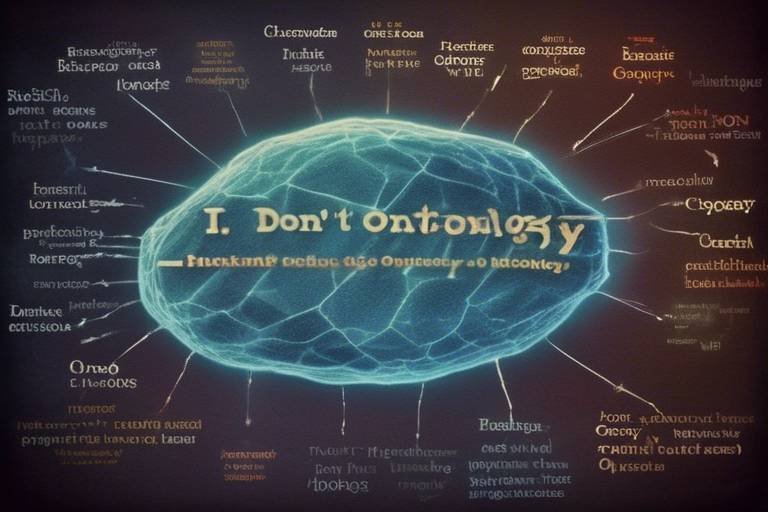The Fundamentals of Metaphysical Realism
Welcome to the intriguing world of metaphysical realism, a philosophical stance that invites us to ponder the very nature of existence. Have you ever wondered if the world around you exists independently of your thoughts and perceptions? This article explores the core principles of metaphysical realism, including its philosophical implications, key thinkers, and its relevance in contemporary debates about reality and perception. By the end of this journey, you will have a clearer understanding of this fascinating topic and perhaps even some questions of your own!
At its core, metaphysical realism asserts that the world exists independently of our perceptions. Imagine walking through a forest; the trees, the earth, and the sky exist whether or not you notice them. This foundational concept distinguishes metaphysical realism from other philosophical views, such as idealism, which posits that reality is mentally constructed. In this section, we will delve into the foundational concepts that underpin metaphysical realism, emphasizing how these ideas challenge our understanding of reality itself. This isn't just a dry philosophical debate—it's a profound inquiry into the nature of existence!
Throughout history, various philosophers have shaped the landscape of metaphysical realism, leaving behind a rich tapestry of ideas that continue to influence contemporary thought. From the ancient wisdom of Aristotle to modern thinkers, each has contributed unique insights that help us navigate the complexities of reality. In this section, we will highlight some of the most influential figures and their contributions to the development of this philosophical stance.
Aristotle, often hailed as the father of Western philosophy, laid the groundwork for metaphysical realism with his emphasis on substance and existence. His ideas resonate through the ages, providing a framework for understanding the nature of reality. Aristotle argued that substances are the fundamental entities in the world, and they possess an essence that defines what they are. This perspective remains relevant today, as many contemporary philosophers draw upon his concepts to form their own arguments about reality.
Understanding Aristotle's concepts of substance and essence is crucial for grasping the claims of metaphysical realism. Substance refers to the underlying entities that make up reality, while essence pertains to the properties that define those entities. For instance, consider a chair. Its substance is the material it is made of, while its essence includes its function and form. This distinction is vital, as it helps us navigate the complexities of what it means for something to truly exist.
As we move into the modern era, philosophers have adapted Aristotle's ideas to fit current metaphysical debates. Contemporary thinkers explore how these ancient concepts can be reconciled with advancements in science and our evolving understanding of the universe. This ongoing dialogue illustrates the dynamic nature of philosophical inquiry, demonstrating that metaphysical realism is not a stagnant doctrine but rather a living, breathing conversation about the nature of reality.
Despite its rich history, metaphysical realism faces numerous challenges from various philosophical perspectives. Critics question its validity, arguing that our perceptions inevitably shape our understanding of reality. In this section, we will discuss these challenges and their implications for the ongoing philosophical discourse surrounding metaphysical realism. Isn't it fascinating how a single idea can spark so much debate?
Supporters of metaphysical realism present several compelling arguments advocating for its validity. These arguments emphasize the importance of an objective reality that exists independently of human thought. One of the key aspects of these arguments is the relationship between perception and reality, which we will explore in the following subsections.
How does metaphysical realism reconcile the relationship between perception and an objective reality? This is a crucial question that underpins much of philosophical discourse. Proponents argue that while our perceptions may be subjective, they do not alter the existence of an objective reality. For instance, if two people see the same tree but describe it differently, the tree still exists as a substance in the world, independent of their interpretations. This distinction is vital for understanding the nature of truth in philosophical discussions.
Another significant intersection with metaphysical realism is scientific realism. This viewpoint posits that scientific discoveries support the existence of an objective reality that is independent of human thought. For example, the laws of physics apply universally, regardless of whether we understand them or not. This alignment between scientific inquiry and metaphysical realism reinforces the idea that there is a reality out there waiting to be discovered, much like an undiscovered treasure in the depths of the ocean.
While metaphysical realism has its supporters, it is not without its critics. Various philosophical perspectives challenge the tenets of metaphysical realism, offering alternative views on reality. This section presents the main critiques and their philosophical implications, highlighting the vibrant debate surrounding this topic.
The debate between idealism and realism is central to understanding metaphysical realism. Idealists argue that reality is fundamentally shaped by our perceptions and consciousness, challenging the notion of an independent reality. This perspective raises interesting questions about the nature of existence and invites us to consider how much our minds influence the world around us.
Postmodern thinkers often reject the tenets of metaphysical realism, offering critiques that emphasize the fluidity of truth and reality. They argue that our understanding of reality is constructed through language and culture, suggesting that there is no single objective reality to discover. This perspective challenges us to rethink our assumptions about truth and reality, pushing the boundaries of philosophical inquiry.
- What is metaphysical realism? Metaphysical realism is the philosophical view that the world exists independently of our perceptions.
- Who are the key philosophers associated with metaphysical realism? Key figures include Aristotle, who laid the groundwork for the philosophy, and many modern thinkers who have adapted his ideas.
- What are the main arguments for metaphysical realism? Supporters argue for the existence of an objective reality that is independent of human thought, emphasizing the relationship between perception and reality.
- What are the critiques of metaphysical realism? Critics, including idealists and postmodern thinkers, argue that reality is shaped by perceptions and cultural constructs.

Defining Metaphysical Realism
Metaphysical realism is a philosophical doctrine that posits the existence of a world that is independent of our perceptions and thoughts. Imagine a vast landscape stretching beyond the horizon, filled with mountains, rivers, and valleys that exist whether or not anyone is there to witness them. This idea challenges us to consider the nature of reality itself and how our understanding of it is shaped. At its core, metaphysical realism asserts that entities, properties, and facts exist in a manner that is not contingent upon human awareness or interpretation.
The fundamental premise of metaphysical realism is that there is an objective reality that remains constant, regardless of our subjective experiences. This is a stark contrast to other philosophical perspectives, such as idealism, which argues that reality is mentally constructed or immaterial. To put it simply, metaphysical realism insists that the world is not merely a figment of our imagination or a construct of our minds; it is a tangible entity with its own existence. This leads us to ponder questions like: What does it mean for something to exist? How do we know what we know?
One of the main distinctions of metaphysical realism is its rejection of skepticism about the external world. Skeptics might argue that our senses can deceive us, leading to a perception of reality that may not align with the actual state of affairs. In contrast, metaphysical realists maintain that while our perceptions may be flawed, they do not negate the existence of an external reality. This belief encourages a robust exploration of truth, knowledge, and existence, urging us to delve deeper into the nature of being.
To further clarify this perspective, consider the following key features of metaphysical realism:
- Independence of Reality: The world exists independently of our thoughts and perceptions.
- Objective Truth: Truth is not subjective; rather, it is based on facts that exist outside human interpretation.
- Existence of Entities: Objects, properties, and facts have an existence that does not rely on human observation.
In summary, metaphysical realism invites us to explore a world that is rich, complex, and fundamentally independent of our minds. It challenges us to seek a deeper understanding of reality, urging us to bridge the gap between perception and existence. As we navigate through this philosophical landscape, we must grapple with the implications of believing in an objective reality—what does it mean for our understanding of truth, knowledge, and existence itself?

Key Philosophers in Metaphysical Realism
Throughout history, the concept of metaphysical realism has been shaped and influenced by numerous philosophers whose ideas continue to resonate in modern discussions. These thinkers have contributed to the foundational principles of metaphysical realism, providing insights that challenge and refine our understanding of reality. Their work not only lays the groundwork for contemporary thought but also sparks ongoing debates about the nature of existence and perception.
One of the earliest and most significant figures in this realm is Aristotle. His exploration of substance and essence has profoundly impacted metaphysical realism. Aristotle posited that the world is composed of substances, which have an independent existence that does not rely on our perceptions. This foundational idea asserts that things exist in their own right, regardless of whether we perceive them or not. Aristotle's emphasis on essence—that which makes a substance what it is—further solidifies the notion that reality is objective and can be understood through rational inquiry.
Moving forward in time, we encounter René Descartes, who, despite being often associated with idealism, contributed significantly to metaphysical realism through his method of doubt. Descartes famously said, "I think, therefore I am," establishing a clear distinction between the thinking subject and the external world. His work laid the groundwork for later philosophers to argue that while our perceptions may be fallible, they do not negate the existence of an objective reality. Descartes' exploration of dualism also opened avenues for discussions about the relationship between mind and matter, which remains relevant in contemporary debates.
Another pivotal figure is David Lewis, a modern philosopher known for his defense of modal realism, which posits that all possible worlds are as real as the actual world we inhabit. Lewis's ideas challenge traditional notions of reality by suggesting that our understanding of existence can encompass a multitude of potentialities. This perspective invites us to reconsider how we define reality, pushing the boundaries of metaphysical realism into new territories.
Furthermore, W.V.O. Quine played a crucial role in bridging the gap between metaphysical realism and scientific realism. He argued against the strict separation of analytic and synthetic truths, advocating for a holistic view of knowledge that incorporates scientific inquiry. Quine's work emphasizes that our understanding of reality is not merely a matter of perception but is deeply intertwined with our scientific explorations and theories. This integration of science and philosophy underscores the relevance of metaphysical realism in contemporary discussions about the nature of truth.
In summary, the contributions of these key philosophers—Aristotle, René Descartes, David Lewis, and W.V.O. Quine—have significantly shaped the landscape of metaphysical realism. Their diverse perspectives provide a rich tapestry of ideas that continue to influence philosophical discourse today. As we navigate through the complexities of reality and perception, the insights offered by these thinkers remain invaluable for understanding the philosophical implications of an independent existence.
- What is metaphysical realism? Metaphysical realism is the philosophical position that asserts the existence of a reality independent of our perceptions and beliefs.
- Who are some key philosophers associated with metaphysical realism? Key philosophers include Aristotle, René Descartes, David Lewis, and W.V.O. Quine, each contributing unique perspectives to the discourse.
- How does metaphysical realism differ from idealism? While metaphysical realism posits an objective reality, idealism suggests that reality is fundamentally shaped by our perceptions and consciousness.
- What are the implications of metaphysical realism in contemporary philosophy? Metaphysical realism challenges us to consider the nature of truth and existence, influencing debates in science, ethics, and epistemology.

Aristotle's Influence
When we dive into the realm of metaphysical realism, we cannot overlook the profound impact that Aristotle has had on this philosophical landscape. His ideas about substance and existence form the bedrock upon which much of modern metaphysical thought is built. Aristotle proposed that the world consists of substances—entities that exist independently of our perception. This notion is not just a passing thought; it’s a fundamental principle that asserts reality exists beyond our subjective experiences. Imagine trying to understand a painting solely based on your feelings about it, rather than considering the actual colors and brushstrokes used by the artist. Aristotle encourages us to look at the painting itself, to acknowledge its existence apart from our interpretations.
One of the key concepts that Aristotle introduced is the distinction between substance and essence. Substance refers to what something is, while essence refers to the characteristics that make it what it is. For instance, consider a tree. The substance is the tree itself—its trunk, branches, and leaves—while the essence could be described as its ability to grow, produce oxygen, and provide shelter. This separation is crucial for metaphysical realism because it helps clarify that our understanding of reality is not merely a product of our perceptions but is grounded in the actual characteristics of the world around us.
Furthermore, Aristotle’s influence extends into contemporary philosophical debates, where modern thinkers reinterpret his ideas to address current metaphysical challenges. For example, the question of whether reality is objective or subjective often harkens back to Aristotle’s assertions. In today’s discussions, philosophers grapple with how Aristotle’s framework can be applied to contemporary issues such as the nature of consciousness and the existence of universals. By adapting Aristotle's principles, modern philosophers can argue for a more nuanced understanding of reality that acknowledges both the objective world and our subjective experiences.
To illustrate Aristotle's enduring influence, let’s consider a comparison table that highlights his contributions alongside contemporary interpretations:
| Aristotle's Concepts | Contemporary Interpretations |
|---|---|
| Substance as independent reality | Objective realism in scientific discourse |
| Essence defines characteristics | Philosophical discussions on identity and existence |
| Distinction between potentiality and actuality | Debates on virtual reality and existence |
In summary, Aristotle's influence on metaphysical realism is both profound and far-reaching. His exploration of substance and essence provides a framework that continues to resonate in modern philosophical discussions. Whether we are challenging the nature of reality or examining the implications of scientific discoveries, Aristotle's principles serve as a guiding light, illuminating the path toward a deeper understanding of existence. As we navigate these complex philosophical waters, it’s essential to remember that the discussions surrounding metaphysical realism are not just academic exercises; they shape our understanding of the world and our place within it.
- What is metaphysical realism? Metaphysical realism is the philosophical position that asserts the existence of a reality independent of our perceptions and beliefs.
- How did Aristotle contribute to metaphysical realism? Aristotle introduced concepts of substance and essence, emphasizing that reality exists independently of our subjective experiences.
- Why is the distinction between substance and essence important? This distinction helps clarify that our understanding of reality is grounded in actual characteristics, rather than just our perceptions.
- How do modern philosophers interpret Aristotle's ideas? Modern thinkers adapt Aristotle's principles to address contemporary metaphysical challenges, exploring topics like consciousness and the nature of reality.

Substance and Essence
When diving into the philosophical waters of metaphysical realism, one cannot overlook the profound concepts of substance and essence, which are foundational to understanding reality as proposed by Aristotle. To Aristotle, substance is what something is fundamentally; it is the core of existence that remains constant, while essence refers to the intrinsic nature or indispensable quality of that substance. Think of substance as the physical body of an object, while essence is akin to its soul—without the soul, the body is merely a shell, devoid of meaning or purpose.
Aristotle argued that substances are individual entities that exist in the world, such as a tree, a rock, or a human being. These substances are characterized by their properties and behaviors, which can change without altering the fundamental nature of the substance itself. For instance, a tree may lose its leaves in autumn, but it remains a tree—its essence as a living organism persists. This distinction is crucial for metaphysical realism, as it posits that reality is structured and that there are objective truths about the world that exist independently of our perceptions.
To further elucidate this, consider the following table that contrasts substance and essence:
| Concept | Definition | Example |
|---|---|---|
| Substance | The fundamental entity that exists. | A specific tree in a forest. |
| Essence | The intrinsic nature or quality of a substance. | The characteristic of being a living organism. |
Understanding these concepts allows us to grasp how metaphysical realism asserts that there are aspects of reality which exist beyond human thought or perception. In this light, the essence of a substance is not merely a product of our minds but a reflection of an objective reality that persists regardless of individual beliefs or interpretations. This leads us to ponder: if our perceptions shape our understanding of reality, what happens when those perceptions clash with the unyielding truths of substance and essence?
Moreover, the interplay between substance and essence invites us to consider modern interpretations of Aristotle's ideas. Contemporary philosophers have expanded upon these concepts, often integrating them into discussions about identity, existence, and the nature of reality itself. They argue that recognizing the distinction between what something is (substance) and what it means to be that thing (essence) is vital in navigating the complexities of modern metaphysical debates.
In conclusion, the exploration of substance and essence is not just an academic exercise; it is a gateway to understanding the very fabric of reality. By engaging with these ideas, we can better appreciate the rich philosophical discourse surrounding metaphysical realism and its implications for how we perceive and interact with the world around us.
- What is metaphysical realism? Metaphysical realism is the philosophical view that the world exists independently of our perceptions, suggesting that there are objective truths about reality.
- How do substance and essence relate to metaphysical realism? Substance refers to the fundamental entities that exist, while essence pertains to their intrinsic qualities. Together, they help define the nature of reality in metaphysical realism.
- Who was Aristotle and why is he important to metaphysical realism? Aristotle was a Greek philosopher whose ideas on substance and essence laid the groundwork for metaphysical realism, influencing subsequent philosophical thought.
- What are some contemporary interpretations of Aristotle's ideas? Modern philosophers have adapted Aristotle's concepts to address current metaphysical debates, exploring how they apply to identity, existence, and reality.

Modern Interpretations
In the realm of philosophy, the interpretation of metaphysical realism has evolved significantly, particularly in light of contemporary debates and advancements in various fields. Modern philosophers have taken the foundational ideas established by thinkers like Aristotle and re-examined them through the lens of current scientific and philosophical developments. This reinterpretation is crucial as it allows metaphysical realism to remain relevant and adaptable in a rapidly changing intellectual landscape.
One of the key aspects of modern interpretations is the integration of scientific advancements into the discourse of metaphysical realism. As our understanding of the universe expands—thanks to fields like quantum physics and cosmology—the question arises: how do these discoveries inform our understanding of reality? Philosophers today are increasingly considering how empirical evidence supports the notion that an objective reality exists, independent of our perceptions. This intersection of science and philosophy serves as a robust foundation for advocating metaphysical realism in contemporary discussions.
Moreover, modern interpretations often emphasize the contextuality of knowledge. Philosophers like Hilary Putnam and Richard Rorty have challenged traditional notions of realism by suggesting that our understanding of reality is heavily influenced by social and historical contexts. They argue that while an objective reality may exist, our access to it is mediated through our experiences, language, and cultural frameworks. This raises intriguing questions: Does our perception of reality shape reality itself? Or does reality exist in a vacuum, unaffected by human interpretation? These inquiries highlight the dynamic interplay between reality and perception, which is a cornerstone of modern metaphysical realism.
Another significant development in modern interpretations is the rise of pragmatism. Pragmatists argue that the truth of a belief is determined by its practical consequences and applications. This perspective offers a fresh lens through which to view metaphysical realism, suggesting that while an objective reality exists, our understanding of it is shaped by its utility in our lives. This pragmatic approach encourages a more flexible understanding of reality, one that acknowledges the importance of human experience while still asserting the existence of an independent world.
In addition to these philosophical shifts, the advent of digital technology and the internet has also influenced modern interpretations of metaphysical realism. The way we interact with information and each other online raises questions about the nature of reality. For instance, virtual realities and augmented realities challenge our traditional notions of existence and perception. As we navigate these new realms, the principles of metaphysical realism must adapt to address the complexities introduced by technology. Are these digital experiences merely illusions, or do they reflect a new dimension of reality? Such questions are pivotal in understanding how metaphysical realism can evolve in the face of technological advancements.
Ultimately, the modern interpretations of metaphysical realism illustrate a vibrant and ongoing dialogue within philosophy. By engaging with contemporary challenges and integrating insights from various fields, philosophers are not only preserving the relevance of metaphysical realism but are also enriching it. This adaptability is essential for any philosophical framework aiming to address the profound questions of existence, perception, and reality in our ever-evolving world.

Contemporary Challenges
In the landscape of modern philosophy, metaphysical realism faces a myriad of challenges that question its foundational premises. As we delve into the intricate web of contemporary thought, it becomes evident that the philosophical discourse surrounding reality is far from settled. One of the most pressing challenges comes from the realm of epistemology, which examines the nature and scope of knowledge. How can we claim to know an objective reality if our perceptions are inherently subjective? This question resonates deeply within the philosophical community, as it raises concerns about the reliability of our senses and the potential for bias in our understanding of the world.
Furthermore, the rise of constructivist theories has introduced a compelling counter-narrative to metaphysical realism. Constructivism posits that our understanding of reality is shaped by social, cultural, and linguistic contexts. This perspective suggests that what we perceive as "real" is not merely a reflection of an independent world but rather a construct of our interactions and interpretations. In this light, metaphysical realism appears to be an oversimplification of a much more complex interplay between perception and reality.
Another significant challenge arises from the advancements in quantum physics, which have prompted philosophers to reconsider the nature of reality itself. Quantum mechanics introduces concepts such as superposition and entanglement, which defy classical notions of an objective, observer-independent world. As scientists probe deeper into the fabric of reality, they uncover phenomena that seem to suggest that our traditional understanding of existence may need a radical overhaul. This intersection of science and philosophy invites a reevaluation of metaphysical realism, as it grapples with the implications of a reality that may not conform to our intuitive perceptions.
Moreover, the postmodern critique adds another layer of complexity to the discourse. Postmodern thinkers argue that the very concept of an objective reality is a construct of power dynamics and cultural narratives. They assert that what we consider to be "truth" is often a reflection of societal norms and ideologies rather than an absolute state of affairs. This perspective challenges the claims of metaphysical realism by suggesting that reality is not a singular entity but a tapestry woven from diverse interpretations and experiences.
In light of these challenges, proponents of metaphysical realism must engage with these critiques thoughtfully. They might argue that while our perceptions are indeed influenced by various factors, this does not negate the existence of an objective reality. Instead, it highlights the need for a more nuanced understanding of the relationship between perception and reality. The ongoing dialogue between metaphysical realism and its challengers is crucial for the evolution of philosophical thought, as it pushes the boundaries of what we consider to be real.
- What is metaphysical realism? Metaphysical realism is the philosophical position that asserts the existence of a reality independent of our perceptions or beliefs.
- Who are some key philosophers associated with metaphysical realism? Key figures include Aristotle, who laid the groundwork for the concept, and contemporary philosophers who have expanded upon his ideas.
- What are the main challenges faced by metaphysical realism today? Challenges include epistemological concerns, constructivist theories, advancements in quantum physics, and postmodern critiques.
- How does metaphysical realism relate to scientific realism? Scientific realism often intersects with metaphysical realism, as both assert the existence of an objective reality that can be understood through scientific inquiry.

Arguments for Metaphysical Realism
Supporters of metaphysical realism present a variety of compelling arguments that advocate for its validity, each touching upon fundamental aspects of existence and our understanding of reality. One of the core tenets of metaphysical realism is the belief that the world exists independently of our perceptions. This idea resonates deeply with our everyday experiences; after all, we often find ourselves questioning the nature of reality—what is real, and what is merely a figment of our imagination? Metaphysical realism provides a robust framework for distinguishing between these two realms.
One significant argument in favor of metaphysical realism is the reconciliation of perception and reality. Advocates argue that while our perceptions may be subjective and can vary from person to person, the existence of an objective reality remains constant. For instance, consider two individuals witnessing the same sunset. While their emotional responses and interpretations may differ, the sunset itself exists as an objective phenomenon. This illustrates the idea that perception does not alter the fundamental nature of reality. The importance of truth in philosophical discourse hinges on this distinction, as it emphasizes that our beliefs and perceptions should align with an objective reality.
Another compelling argument stems from the intersection of metaphysical realism and scientific realism. Scientific discoveries often provide evidence supporting the existence of an objective reality that operates independently of human thought. For example, the laws of physics apply universally, regardless of individual beliefs or perceptions. When scientists conduct experiments, they rely on the assumption that the phenomena they are studying exist outside of their subjective experiences. This reliance on an objective framework underpins the scientific method and reinforces the validity of metaphysical realism. As we delve deeper into scientific inquiry, we find that the discoveries made often align with the principles of metaphysical realism, suggesting a shared foundation for understanding reality.
Moreover, metaphysical realism fosters a sense of stability and consistency in our understanding of the world. Imagine navigating a ship on the ocean; if the waters were constantly shifting based on individual perceptions, it would be nearly impossible to chart a course. However, metaphysical realism posits that there are fixed points—objective truths—that we can rely upon, allowing us to navigate through life with a clearer sense of direction. This consistency is crucial not only in scientific endeavors but also in our everyday interactions and decisions.
In addition, the arguments for metaphysical realism emphasize the importance of a shared reality in fostering communication and collaboration. If everyone operated under their own subjective realities, meaningful dialogue and cooperation would become exceedingly challenging. The ability to discuss ideas, share experiences, and work together relies on a common understanding of the world around us. Metaphysical realism provides the philosophical grounding for such shared experiences, ensuring that there is a reality we can all refer to, regardless of our individual perceptions.
In summary, the arguments for metaphysical realism are multifaceted, addressing the relationship between perception and reality, the support from scientific inquiry, and the necessity for a stable and shared understanding of the world. These arguments not only highlight the philosophical significance of metaphysical realism but also its practical implications in our daily lives. As we continue to explore the depths of reality and perception, metaphysical realism stands as a compelling perspective that invites us to consider the nature of existence itself.
- What is metaphysical realism?
Metaphysical realism is the philosophical view that the world exists independently of our perceptions and beliefs.
- How does metaphysical realism differ from idealism?
While metaphysical realism asserts an independent reality, idealism posits that reality is fundamentally shaped by our perceptions and consciousness.
- Why is scientific realism important to metaphysical realism?
Scientific realism supports metaphysical realism by providing evidence that an objective reality exists, which is crucial for the validity of scientific inquiry.
- Can metaphysical realism coexist with subjective experiences?
Yes, metaphysical realism acknowledges that while perceptions may vary, they do not alter the existence of an objective reality.

Perception and Reality
When we dive into the intricate relationship between perception and reality, we uncover a fascinating landscape where our senses play a pivotal role in shaping our understanding of the world. Imagine standing in front of a beautiful painting; the colors, strokes, and composition evoke emotions and thoughts that are uniquely yours. But what if I told you that the painting exists independently of your feelings? This is the crux of metaphysical realism—it posits that an objective reality exists, regardless of how we perceive it.
Metaphysical realism asserts that while our perceptions are subjective and can be influenced by a multitude of factors—such as culture, experience, and even mood—there is a reality that remains constant. Think of it like a movie playing on a screen. The film (reality) is there, but each viewer (us) interprets it differently based on their own experiences and emotions. This analogy highlights a crucial point: our perceptions may vary, but they do not alter the existence of the film itself.
To further illustrate this relationship, consider the following aspects:
- Objective Truth: Metaphysical realism emphasizes that truth exists independently of our beliefs or perceptions. For instance, the statement "The Earth revolves around the Sun" holds true regardless of individual opinions.
- Shared Reality: Our shared experiences of reality, such as the laws of physics, suggest an underlying objective world that we all interact with, even though our interpretations may differ.
- Limitations of Perception: Human perception is limited. We cannot see all wavelengths of light or hear all frequencies of sound, yet this does not negate the existence of those wavelengths and frequencies.
Philosophers who support metaphysical realism argue that acknowledging an objective reality is essential for meaningful discourse. If we were to dismiss the existence of an independent reality, we would be left with a chaotic framework where truth becomes subjective, leading to a slippery slope of relativism. This perspective is vital, especially in fields like science, where empirical evidence relies on the assumption that an objective reality can be observed, measured, and understood.
In conclusion, the interplay between perception and reality is a complex dance. While our perceptions shape our experiences and understanding, metaphysical realism reminds us that there is a reality that exists beyond our interpretations. Embracing this notion not only enriches our philosophical discussions but also grounds us in a shared understanding of the world around us.
- What is metaphysical realism? Metaphysical realism is the philosophical view that an objective reality exists independently of our perceptions or beliefs.
- How does perception affect our understanding of reality? Perception shapes our experiences and interpretations of reality, but it does not change the existence of reality itself.
- Why is metaphysical realism important in philosophy? It provides a foundation for discussions about truth, knowledge, and the nature of reality, emphasizing that some truths are objective and not subject to individual interpretation.

Scientific Realism
When we dive into the realm of , we uncover a fascinating intersection where science and philosophy collide. At its core, scientific realism posits that the universe exists independently of our perceptions and that the entities described by science—be they atoms, forces, or even galaxies—are real and not merely constructs of our minds. This perspective isn’t just a philosophical stance; it’s a robust framework that supports the scientific method and our understanding of the universe.
One of the primary arguments for scientific realism is its ability to explain the success of scientific theories. Think about it: when scientists formulate theories and conduct experiments, they consistently achieve results that align with their predictions. This success suggests that these theories are not just useful fictions but are actually revealing truths about the world. For example, consider the way we understand gravity. Isaac Newton’s laws of motion and gravity were not just mathematical tools; they described an actual force that governs the movement of celestial bodies. Similarly, Einstein’s theory of general relativity provided a deeper understanding of gravity, further affirming the reality of the forces at play.
Moreover, scientific realism emphasizes the importance of truth in scientific inquiry. It argues that science aims to uncover truths about the world, and this pursuit is not merely subjective. The idea that scientific theories can be objectively evaluated and tested provides a solid ground for claiming that there is an external reality that science seeks to understand. This stands in stark contrast to more skeptical views, which might argue that our scientific theories are just convenient ways of organizing observations without any claim to truth.
However, this doesn’t mean that scientific realism is without its critics. Some philosophers argue that the history of science shows us that theories we once thought were true have been discarded or replaced. For instance, the transition from Newtonian physics to quantum mechanics raises questions about the ultimate reality of the entities described by both theories. Are electrons truly particles, or are they waves? This ongoing debate highlights the complexities and challenges in asserting the existence of an objective reality as described by scientific theories.
In summary, scientific realism serves as a crucial pillar in the broader discussion of metaphysical realism. It champions the idea that an objective reality exists, independent of our perceptions, and that science is a reliable means of uncovering this reality. As we continue to explore the universe and refine our scientific theories, the dialogue between scientific realism and metaphysical realism will undoubtedly evolve, prompting deeper questions about the nature of existence itself.
- What is the difference between scientific realism and metaphysical realism?
Scientific realism focuses specifically on the claims made by scientific theories, asserting that they describe an objective reality. In contrast, metaphysical realism encompasses a broader philosophical view that reality exists independently of our perceptions, including but not limited to scientific observations. - Why do some philosophers reject scientific realism?
Critics of scientific realism often point to the historical changes in scientific theories, arguing that past theories have been proven wrong. They suggest that our current scientific understanding may also be subject to change, leading to skepticism about the idea of an objective reality as described by science. - How does scientific realism relate to everyday experiences?
Scientific realism asserts that the objects and phenomena we encounter in our daily lives, such as gravity or chemical reactions, are real and can be understood through scientific inquiry. This perspective encourages a trust in the scientific method as a means of gaining knowledge about the world.

Critiques of Metaphysical Realism
Metaphysical realism, while a significant philosophical stance, is not without its detractors. Critics argue against its core tenets, offering alternative views on the nature of reality and perception. One of the most prominent critiques comes from the realm of idealism, which posits that reality is fundamentally shaped by our perceptions and mental experiences. Idealists assert that what we consider to be the external world is, in fact, a construct of our minds. This challenges the metaphysical realist's assertion that an objective reality exists independently of our thoughts. In essence, the idealist perspective raises a compelling question: if our perceptions shape our reality, can we ever truly know an objective world?
Furthermore, the rise of postmodernism has introduced additional skepticism towards metaphysical realism. Postmodern thinkers argue that the very notion of an objective reality is a social construct, influenced by cultural narratives and power dynamics. They contend that truth is not a singular, absolute entity but rather a mosaic of perspectives shaped by individual experiences and societal contexts. This perspective leads to the conclusion that the quest for an objective reality may be futile, as each person's understanding of the world is inherently subjective. This critique not only challenges the foundations of metaphysical realism but also invites a broader discussion about the nature of truth itself.
Moreover, the critiques extend to the implications of metaphysical realism in scientific discourse. While proponents argue that scientific discoveries affirm an independent reality, critics point out that scientific theories are often revised or replaced as new evidence emerges. This raises a critical question: if our understanding of reality is subject to change, can we genuinely claim to have access to an objective truth? The dynamic nature of scientific inquiry suggests that our grasp of reality may be more fluid than metaphysical realists would like to admit.
In summary, the critiques of metaphysical realism highlight significant philosophical debates regarding the nature of reality and perception. They challenge us to reconsider our assumptions about what constitutes truth and how our understanding of the world is shaped by various factors. By engaging with these critiques, we can deepen our understanding of metaphysical realism and its place in contemporary philosophical discussions.
- What is metaphysical realism?
Metaphysical realism is the philosophical view that the world exists independently of our perceptions or beliefs about it. - Who are the main critics of metaphysical realism?
Critics include idealists, who argue that reality is shaped by perception, and postmodern thinkers, who view truth as a construct influenced by cultural contexts. - How does scientific realism relate to metaphysical realism?
Scientific realism supports the idea of an objective reality, suggesting that scientific discoveries reflect truths about the world that exist independently of human thought. - Why is the debate between idealism and realism important?
This debate is crucial for understanding differing perspectives on the nature of reality and how it can be known or understood.

Idealism vs. Realism
When diving into the philosophical waters of idealism and realism, it’s like stepping into a vibrant debate that has echoed through the ages. At its core, this discussion revolves around the nature of reality itself. Idealism posits that reality is fundamentally mental, suggesting that our perceptions shape the world around us. In contrast, realism argues that the world exists independently of our thoughts and perceptions. Imagine two artists painting the same landscape: the idealist sees only the colors and emotions that the scene evokes, while the realist captures the scene as it is, complete with every detail and nuance.
One of the most significant challenges idealism poses to realism is the question of perception. How can we trust our senses to provide an accurate representation of reality if our minds filter and interpret these experiences? This philosophical quandary leads to the assertion that our understanding of the world is inherently subjective. For idealists, this subjectivity is not a flaw but a feature of human experience. They argue that without the mind's interpretation, the world would be devoid of meaning. In this light, reality is not just a collection of objects but a tapestry woven from our thoughts and experiences.
On the other hand, realism holds a steadfast belief in an objective reality. It suggests that there are facts about the world that remain true regardless of human perception. To illustrate this point, consider a simple example: a tree standing in a forest. An idealist might argue that the tree's existence is shaped by our perception of it—its beauty, its symbolism, and its impact on our feelings. Meanwhile, a realist would assert that the tree exists whether or not anyone is there to witness it. This fundamental difference in viewpoint raises intriguing questions about the very nature of existence and knowledge.
Philosophers like Immanuel Kant have tried to bridge this divide, suggesting that while we can never know the thing-in-itself (the objective reality), we can still have meaningful knowledge of the world through our experiences. This perspective acknowledges the role of the observer while maintaining that an objective reality exists beyond our perceptions. In this way, Kant's work serves as a middle ground, recognizing both the subjective nature of our experiences and the independent existence of the world around us.
As we navigate through these philosophical waters, it's essential to recognize how these debates influence contemporary discussions about reality. In a world increasingly shaped by technology and media, the lines between perception and reality blur more than ever. The rise of virtual reality and digital experiences challenges our understanding of what is 'real.' Are we living in an age where idealism reigns supreme, or does the steadfast nature of realism still hold sway? These questions not only fuel academic discussions but also resonate in our daily lives, urging us to reflect on how we perceive the world around us.
In conclusion, the debate between idealism and realism is not merely academic; it is a vital discourse that shapes our understanding of reality. Whether we lean towards the idealist perspective, emphasizing the role of perception and interpretation, or the realist viewpoint, affirming the existence of an objective world, this dialogue is crucial. It encourages us to question our beliefs, consider different viewpoints, and ultimately enrich our understanding of the complex tapestry of existence.
- What is the main difference between idealism and realism? Idealism suggests that reality is mentally constructed, while realism asserts that reality exists independently of our perceptions.
- Can idealism and realism coexist? Yes, some philosophers propose a middle ground, acknowledging both subjective experiences and an objective reality.
- How do these philosophies impact our understanding of knowledge? They challenge us to consider the sources of our knowledge and the validity of our perceptions.

Postmodern Perspectives
When we dive into the world of postmodernism, we encounter a fascinating shift in how reality is perceived and understood. Postmodern thinkers often challenge the fundamental tenets of metaphysical realism, arguing that our understanding of reality is not merely a reflection of an objective world but is instead shaped by cultural, social, and linguistic contexts. This perspective suggests that what we consider to be 'real' is heavily influenced by our experiences and the narratives we construct around them.
One of the key arguments presented by postmodern theorists is that truth is subjective. They assert that different individuals or cultures may have their own interpretations of reality, leading to a pluralistic view of existence. For instance, consider how different societies perceive concepts such as justice, beauty, or morality. These values can vary significantly, suggesting that there is no single, objective reality that can be universally applied. Instead, reality becomes a tapestry woven from countless perspectives and experiences, making it inherently complex and multifaceted.
Moreover, postmodernism often critiques the idea of a grand narrative or a single overarching truth. This notion is encapsulated in the famous phrase by Jean-François Lyotard: "Incredulity towards metanarratives." This skepticism towards universal truths means that postmodern thinkers are likely to question the claims of metaphysical realism, which posits an independent reality that exists regardless of human perception. They argue that such claims can lead to a form of dogmatism, ignoring the rich diversity of human experience and understanding.
Additionally, the postmodern perspective emphasizes the role of language in shaping our reality. According to thinkers like Jacques Derrida and Michel Foucault, language is not simply a tool for describing reality; it actively constructs it. This idea aligns with the postmodern belief that our perceptions of reality are mediated through language, which can distort or reshape our understanding of the world. As a result, the postmodern critique of metaphysical realism calls into question whether we can ever truly know an objective reality, as our perceptions are always filtered through the lens of language and cultural context.
In summary, postmodern perspectives present a compelling challenge to the ideas put forth by metaphysical realism. By emphasizing subjectivity, the rejection of grand narratives, and the role of language, postmodern thinkers encourage a more nuanced understanding of reality that recognizes the complexities and diversities of human experience. This ongoing dialogue between metaphysical realism and postmodern thought invites us to reflect on our own assumptions about the nature of reality and the ways in which we engage with it.
- What is metaphysical realism? Metaphysical realism is the philosophical viewpoint that asserts the existence of a reality independent of human perceptions or beliefs.
- How does postmodernism differ from metaphysical realism? Postmodernism challenges the idea of an objective reality, emphasizing subjectivity and the influence of cultural narratives on our understanding of truth.
- Who are some key figures in postmodern philosophy? Notable postmodern thinkers include Jacques Derrida, Michel Foucault, and Jean-François Lyotard.
- Can metaphysical realism and postmodernism coexist? While they present contrasting views, the dialogue between these perspectives can enrich our understanding of reality.
Frequently Asked Questions
- What is metaphysical realism?
Metaphysical realism is the philosophical view that asserts the existence of a reality that is independent of our perceptions or beliefs. In simpler terms, it means that the world exists out there, regardless of whether we are aware of it or not. Think of it like a book sitting on a table; it remains there whether or not anyone is reading it.
- Who are the key philosophers associated with metaphysical realism?
Several influential philosophers have shaped the discourse around metaphysical realism, with Aristotle being one of the most notable. His emphasis on substance and essence laid the groundwork for later thinkers. Other modern philosophers have also contributed to this field, adapting Aristotle's ideas to contemporary debates.
- How does metaphysical realism relate to scientific realism?
Metaphysical realism and scientific realism often intersect, as both advocate for the existence of an objective reality. Scientific realism posits that the universe exists independently of human thought and that scientific theories aim to describe this reality accurately. Essentially, both perspectives agree that there is a world out there that can be understood through observation and inquiry.
- What are the main critiques of metaphysical realism?
Critics of metaphysical realism often come from idealist perspectives, which argue that reality is fundamentally shaped by our perceptions and consciousness. Postmodern thinkers also challenge metaphysical realism, suggesting that truth is subjective and constructed rather than objective and independent. These critiques raise important questions about how we understand reality and truth.
- Can metaphysical realism coexist with other philosophical views?
Yes, metaphysical realism can coexist with certain philosophical views, but it often finds itself at odds with idealism and postmodernism. While some philosophies may complement its principles, others directly challenge the notion of an independent reality. This ongoing dialogue is what makes philosophy so intriguing!
- Why is understanding metaphysical realism important?
Understanding metaphysical realism helps us engage in deeper philosophical discussions about reality, perception, and truth. It encourages us to question our assumptions and consider how our beliefs influence our understanding of the world. In a way, it’s like having a map that shows you not just where you are, but where you could potentially go!



















